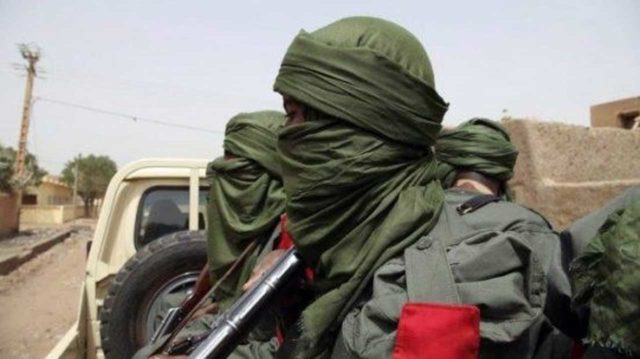
Briefs
Publication: Terrorism Monitor Volume: 19 Issue: 4
By:

Is al-Qaeda’s Nigerian Affiliate Ansaru Behind Ahmad Gumi’s Negotiations with Bandits?
Jacob Zenn
On February 5, Nigerian Islamic scholar Ahmad Gumi negotiated with bandit leaders in northwestern Nigeria to bring security to a region that has been ravaged by conflict between bandits, local communities, and the government (pulse.ng, February 5). Suspicions are growing that the bandits are linked to Boko Haram’s Abubakar Shekau-led faction, which is based in northeastern Nigeria. Shekau had claimed responsibility for bandits’ kidnapping of more than 300 schoolboys in Katsina, northwestern Nigeria, in December 2020. The schoolboys were released after several days in custody (Telegram, December 20, 2020). It is unclear why Shekau lambasted Ahmad Gumi in a subsequent January 6 audio, but it was possibly related to Gumi’s impending negotiations with northwestern Nigerian bandits. This audio was the first time that Shekau had denounced Gumi since 2012 (Telegram, January 6).
Besides Shekau’s faction, Ansaru, which al-Qaeda formally considers its Nigerian affiliate, operates in northwestern Nigeria and likely has a stronger foothold there than Shekau’s loyalists (HumAngle, February 14; Terrorism Monitor, July 28, 2020). In May 2011, not long after Ansaru carried out its first ever kidnapping in northwestern Nigeria of two British and Italian engineers, who were later killed in a rescue attempt, the al-Qaeda-affiliated requested Desert Herald newspaper editor Tukur Mamu to deliver a treatise to Gumi and other prominent Nigerian Salafist scholars. Mamu, who serves as Gumi’s representative when Gumi is away residing in Saudi Arabia, later became Ansaru’s main media contact when it wanted to release statements (Desert Herald, June 2, 20212). This was presumably because Mamu shared several aspects of Ansaru’s ideology, including identifying with Nigeria’s Fulani population, and Desert Herald and Ansaru were both based in Kaduna in north-central, Nigeria (Desert Herald, December 2, 2017).
It is, therefore, notable that Mamu accompanied Gumi when he met with “top commanders” of bandit groups (Desert Herald, January 20). Also notable was that Gumi claimed the bandits were seeking anti-aircraft missiles because Ansaru used such weapons against Nigeria’s air force in Kaduna in January 2020 (punchng.com, February 13; vanguardngr.com, February 5, 2020). Ansaru also would need anti-aircraft weapons because Nigeria’s air force has continued launching airstrikes on “Ansaru bandit” camps in the northwest, including Katsina (prnigeria.com, November 20, 2020). One bandit leader also reminded Gumi during negotiations that “This is how Boko Haram started, Nigeria underestimated us and the problem” (Dailypostng.com, February 4).
Ansaru and, to an extent, Shekau’s faction are certainly in northwestern Nigeria. The historical connection of Gumi, Tukur Mamu, and Ansaru should also raise new questions about whether the al-Qaeda affiliate is operating behind the scenes of the ongoing negotiations between Gumi and bandits in northwestern Nigeria, with Mamu also playing some sort of mediating role. The fact that one bandit leader with whom Gumi met, Dogi Gide, has reported Ansaru ties further suggests the group’s hand in the negotiations (Sahara Reporters, February 19; HumAngle, June 9, 2020).
***
Ethiopia Breaks Up Islamic State Cell in Oromo, But Questions Remain
Jacob Zenn
On January 31, Ethiopia reported that it arrested a group of jihadists in its Oromo region bordering Somalia that was inspired by Islamic State (IS) (borkena.com, January 31). This was surprising because IS has rarely featured Ethiopia in its propaganda and Ethiopians have not been prominent among IS or even al-Shabaab members in neighboring Somalia. Also unusual about these reports are that the cell allegedly had “connections” with al-Shabaab, which is an al-Qaeda affiliate and enemy of IS. Further, the timing of the arrests amid Ethiopia’s ongoing war against rebels in Tigray in the country’s north could mean whether or not the cell was truly affiliated with IS, the announcements about the arrests may have been inflated to divert attention from the conflict in Tigray (Terrorism Monitor, December 17, 2020).
At the same time, Ethiopia’s military released a video of weapons and money captured from the IS suspects that appeared authentic (HCH24 Djibouti, January 25). Also featured were apparent confessions from the IS members and the wives of the suspects, who all wore face coverings. Ethiopia evidently considered it among the most important of the counterterrorism operations that the country has conducted in recent years. Previously, in September 2019, the Ethiopian government warned that IS and al-Shabaab would target hotels in Ethiopia (africanews.com, September 23, 2019). However, no such attacks have taken place since then.
In the near future, it is likely the reported arrest of IS or al-Shabaab members will remain a one-off affair. IS has not traditionally focused on Ethiopia, and al-Shabaab is also focused more on Kenya than Ethiopia in terms of external operations. Moreover, Ethiopia’s conflict in Tigray is forcing the army to reduce its military footprint in Somalia (Somaliaffairs.com, November 15, 2020). This would make it less likely for al-Shabaab to conduct attacks in Ethiopia that could compel Ethiopia’s army to redeploy to Somalia.




